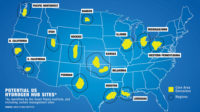A federal judge in Arizona tossed out the Trump Administration’s limited definition of federally-protected US water bodies, saying that it has “fundamental, substantive flaws that cannot be cured" and that its use could cause significant harm.
The court ruling orders that the Trump-revised Navigable Waters Protection Rule, which had vastly altered definitions of Waters of the U.S. (WOTUS) that eased some project requirements set by the Obama Administration in 2015, no longer can be used even as the current US Environmental Protection Agency rewrites the mandate.
The lawsuit was brought by six federally recognized Indian tribes.
Federal district court Judge Rosemary Marquez, in an 11-page decision on Aug. 30, immediately vacated the Trump rule, something the Biden Administration had not sought in this and other federal court cases where the existing mandate was challenged by others.
For decades, WOTUS was defined to include tributaries and impoundments of interstate waters and certain wetlands not adjacent to those waters, the ruling said.
But in 2020 the definition was changed to exclude those wetlands not adjacent to waters and eliminate “ephemeral streams.” EPA’s Science Advisory Board said at the time that the new rule conflicts with established science, weakens protection of the nation’s waters and is inconsistent with the federal Clean Water Act.
EPA and the US Army Corps of Engineers said they intend to restore the WOTUS definition used before the expanded Obama version, which added many more waters to be regulated. 'The Biden Administration supported a "remand" of the rule to the two agencies for reworking but did not favor gutting it.
The administration could appeal the court’s decision, says Lawrence Liebesman, a policy consultant at Dawson & Associates and former attorney in the US Justice Dept environmental division, even though officials "clearly have a problem with Trump’s rule,” he told ENR.
Stricter rules "set up a policy dilemma for the Biden Administration to grapple with,” says Liebesman, noting that they could delay infrastructure project approvals, including those in clean energy sectors. But others, including environmental activists and Interior Secretary Debra Haaland, see the protected waters mandate as an important issue, he says.
Affected businesses could also appeal, claiming the judge's action would cause tremendous harm, Liebesman said. They include Arizona chapters of the Associated General Contractors and Home Builders Association, as well as the National Stone, Sand and Gravel Association
Appealing the ruling also would delay the new Biden rule, which is expected in draft form by the end of the year.
“We need to watch this going forward,” Liebesman said. By vacating the Trump rule, he said the court eliminated the need for the administration to repeal it before the draft new rule could be released.
EPA Administrator Michael Regan said uncertainty over the WOTUS definition has harmed the waters and all stakeholders, who now are providing comment to EPA and the Corps on the revision. “We are committed to crafting an enduring definition of WOTUS by listening to all sides so that we can build on an inclusive foundation,” he said in early August.
“This sensible ruling allows the Clean Water Act to continue to protect all of our waters while the Biden administration develops a replacement rule,” Janette Brimmer, an attorney for Earthjustice, said in a statement. The environmental group, which represented the tribes, said the Trump rule was particularly damaging tor waters in the West, Southwest and Great Lakes by eliminating protection for thousands of wetlands, headwater streams and desert washes.
Business groups who intervened in support of the Trump rule said the change imposed by the federal ruling would leave companies without regulatory certainty, but the judge dismissed their concern, contending that the pre-2015 regulatory regime is familiar to EPA and the Corps as well as to industry.





